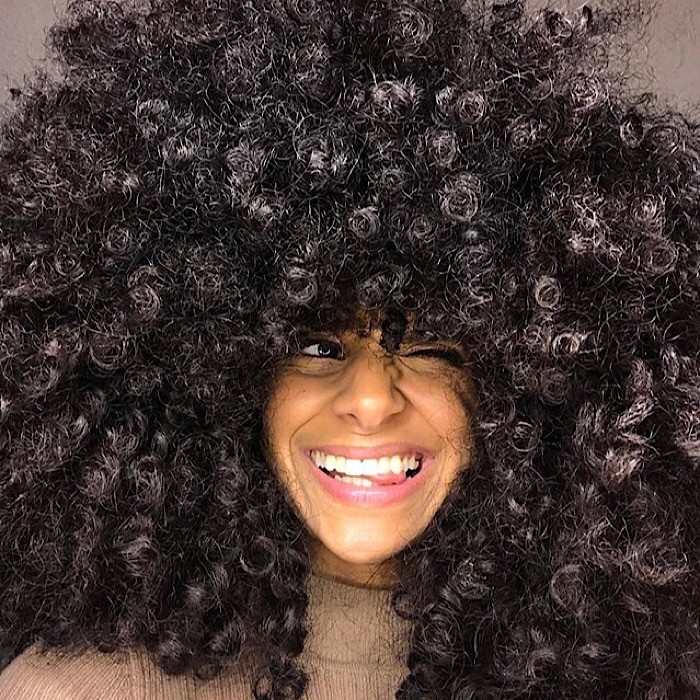6 Foods That Will Make Your Natural Hair Grow Faster
 6 Foods That Will Make Your Natural Hair Grow Faster
6 Foods That Will Make Your Natural Hair Grow Faster
While you might not feel it just yet, the spring season is just a few weeks away. That means warmer weather, blooming flowers, singing birds—and time to create a hair regimen that will keep your tresses as beautiful as ever. Although there are tons of commercial products on the market that will make your curls—pun intended—spring up, there are also some in-season foods during the springtime that you should stock up on. Foods that are delicious, affordable and have a real knack for keeping hair strong and healthy, right into the summer.
1. Strawberries
It’s kind of crazy that, something so sweet, can actually be really good for you. But such is the case with strawberries. This fruit is one that is super high in antioxidants like Vitamin C as well as potassium, folate and manganese. Fiber and protein are in strawberries too. Health-wise, they are the kind of fruit that regulates your blood sugar levels, protects your heart and provides relief from arthritis-related symptoms. Also, the salicylic acid, alpha hydroxy acid and ellagic acid that’s in strawberries can help to prevent hyperpigmentation in your skin, as its anthocyanins and antioxidant properties will keep free radicals at bay. Although magnesium, omega 3 fatty acids and copper are not in super high amounts in this particular fruit, it’s enough to nourish your hair follicles while Vitamin C removes excess sebum from your scalp that could clog your follicles and hinder healthy hair growth.
How to Use Strawberries: If you want to remove excess build-up from your hair without drying it out in the process, all you need to do is mash up five strawberries with two tablespoons of plain yogurt and a teaspoon of honey. Apply the mask to your hair, right after washing it. Let it penetrate your hair shaft for 15-20 minutes. Then rinse and deep condition your tresses.
2. Chayote Squash
Chayote Squash is the kind of squash that is in peak freshness during the spring. It has protein, fiber, vitamins B6, B9, C and K, as well as copper, zinc, magnesium, fiber and manganese in it (for starters). As for overall health benefits go, chayote squash contains antioxidants that reduce body inflammation, folate to keep your pregnancy healthy and nutrients to delay the signs of aging. It’s great for your hair because the combination of the nutrients can delay greying, reduce breakage and strengthen your strands.
How to Use Chayote Squash: Here at Naturally Curly, we’re super fond of squash. So much, in fact, what we wrote an entire feature on winter squash. Try a recipe for winter squash to accomplish better length retention; equally as interchangeable with chayote squash.
3. Mint
Mint is an herb that is rich in all kinds of nutrients. It contains iron, folate, manganese and Vitamin A, and is able to do everything from improve irritable bowel syndrome and relieve cold symptoms to strengthen your brain function. The reason why you should consider using it on your scalp and hair is because the menthol in mint is great at increasing blood circulation to your hair follicles, plus its antimicrobial and antifungal properties can keep dandruff-causing fungus at bay. Mint is also a great source of carotene and antioxidants; both work together to provide your follicles with the nutrients that they need in order for your hair to stay healthy and strong.
How to Use Mint: Crush 5-10 mint leaves together. Add a tablespoon of fresh lemon juice and a teaspoon of melted coconut oil. Apply it to your freshly washed scalp. Let it sit for an hour and then rinse thoroughly. It will invigorate your scalp while removing unnecessary fungi and dandruff flakes too.
4. Kiwi
Kiwi might be tiny, but it makes a really big difference. Thanks to vitamins A, C, B6, B12 and E, along with potassium, calcium, iron and magnesium, kiwi has the ability to boost your immune system, regulate your blood pressure, reduce oxidative stress, protect your vision and even help you to sleep soundly. Something else that kiwi has in it is zinc. Our hair needs lots of that in order to prevent dandruff, hair loss and strengthen our tresses. Eating and applying kiwi can only benefit your hair, long-term.
How to Use Kiwi: One way to use kiwi in order to prevent hair premature greying while strengthening your locks in the process is to combine a tablespoon of fresh kiwi pulp with a teaspoon of Vitamin E and a teaspoon of henna. Apply the solution to your hair and scalp. Put on a plastic bag and let it sit for an hour. Then shampoo, condition and style as usual.
5. Mangoes
If there’s one reason to get hype about spring’s return, it’s because mangoes tend to be at their peak of freshness. Not only do they taste amazing, but they are high in vitamins A, B6, C, E as well as fiber, potassium, folate, calcium and zinc. When it comes to this particular fruit’s health benefits, mangoes are able to lower cholesterol, promote eye and gut health, manage diabetes, treat anemia and delay the physical signs of aging. Mangoes are the perfect “hair fruit” because it contains about 83 percent water; that, along with the E and zinc that is in them, makes mangoes a wonderful ingredient for hair conditioners and moisturizers.
How to Use Mangoes: Are you looking for relief from dry brittle hair, we’ve totally got you. Check out the Naturally Curly article, “DIY Mango Mask and Butter for Dry Hair” for a recipe that will provide your hair with more moisture than ever.
6. Bee Pollen
When you really stop to think about it, it makes perfect sense that bee pollen would be in season during the spring season since bees are back in abundance during that time of year. Bee pollen is high in protein, amino acids, flavonoids, phosphorus, potassium and selenium. Because of this, it’s able to prevent liver toxicity, strengthen immunity, relieve stress, reduce menopausal symptoms and promote overall healing. Something else that’s awesome about bee pollen is it has L‑Cysteine in it; it’s an amino acid that is full of sulfur which is something that our hair needs in order to grow without breaking. The vitamins A and E that’s in the pollen can keep your hair moisturized too.
How to Use Bee Pollen: If you want an all-natural way to treat hair loss, add a tablespoon of bee pollen to your shampoo. You should see results in as little as a month if you do.
Enjoy these foods—and the spring season that is on its way! And share with us if you try them out as well!

